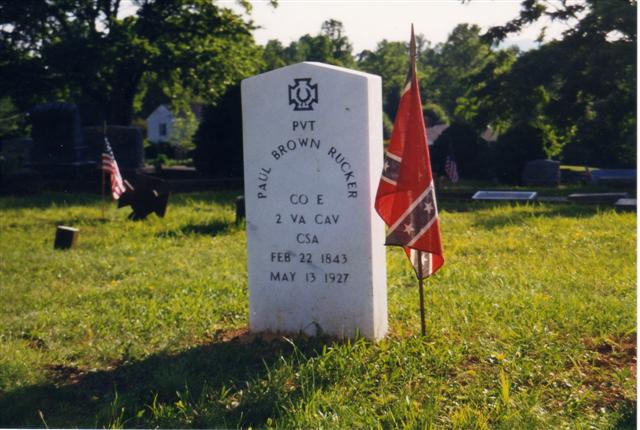A Biographical Sketch of Paul Brown Rucker
Paul Brown Rucker was born the third child of Benjamin Jennings and Eliza Jane of Amherst County, Virginia. He was born after his sister Mary Ellen, whose gravestone shows a birthdate of 4/28/42. The family history claims he was born 2/22/43, only 10 months after his sister. The same source calls him Paul "Jennings", but in all official records his middle name is "Brown", which likely came from his uncle, William Brown Rucker. His parents are on the 1840 Amherst Census, but although not in the 1850 count, must have been present as they paid taxes on 72 acres.
Paul was 16 in 1860, living at home with his parents, which suggests a birthdate in 1844. He was too young to accompany his older brother to war in the spring of 1861, but on 3/10/62 he enlisted at Amherst Courthouse as a private in his brother' s unit, "The Amherst Mounted Rangers" which became Company E, 2nd Virginia Cavalry in April. The subsequent service of that unit is documented in its regimental history, and earned Paul and the other sons of Amherst laurels for gallantry. In 1862 he was one of the best-mounted men of the 2nd Cavalry to accompany J. E.B.Stuart on a Christmas-time raid on Burnside's lines of communication. The unit's muster roll testifies that he was in continuous service to 3/1/64, when he reenlisted at Orange Courthouse for the war's duration.
On 5/28/64, Co. E. was at Haw's Shop, confronting enemy troops concealed in a deep woods. With their ammunition almost gone, it was discovered that columns of the enemy had flanked them on both sides so that their eventual withdrawal was made through a gauntlet of crossfire. Paul was one of 26 regimental casualties, receiving to wounds in his left leg. He was absent from the units muster roll that June, either in a hospital or at home, and the hometown newspaper listed him as "slightly wounded".
Paul's wounds healed, and he must have rejoined his comrades that year. He was at Appomattox in 1865, and elected to surrender there, rather than join some of the other troopers of the 2nd Virginia, who refused surrender and followed their beloved general Munford back to Lynchburg. Paul took his parole at Appomattox Courthouse 4/9/65, surrendering his carbine and saber. By the time he returned home, remnants of the disbanded brigade were awaiting further orders, but when Munford learned that the remainder of the Army was negotiating its surrender, the 2nd Virginia was not called upon for further service. The unit remained disbanded, and its survivors joined Paul in civilian life.
Paul was not present on the 1870 Amherst Census, but on 2/21/78 he and Blanche Higginbotham were issued an Amherst marriage license. Wood claims that they were married 2/30/78, (page 109), but since February can have at most 29 days, she must have been in error. Their son, Edwin, Was Born 12/8/78, and the Three Ruckers Are Listed in the Temperance District in the 1880 census. In 1900 the household included Paul as a literate homeowner and miller, his wife (born October 1849), his son Eddie (21), daughter Vivian E and father-in-law Benjamin Higginbotham. When Paul applied for a Confederate veteran' s pension 5/14/08, he claimed disability from age, his leg wounds, and asthma from 30 years of breathing dust in the mill.
Only Paul and Blanche were at home in the Courthouse District in 1910, but at some point afterwards took in his sister, Claire Graves. She had been having problems for some time, and their physician brother in Richmond, Edwin Timothy Rucker, was her legal guardian. On 9/8/14 Clara G. was institutionalized for morphine and tobacco addictions, and symptoms of psychosis. She lived only another week.
Paul suffered a stroke and was taken to the Lynchburg Hospital, where he succumbed 5/13/27. He Was Buried in Amherst, Almost Certainly with His Family in the Public Cemetery, although the undertaker left no records to identify the exact site. He was survived by a destitute Blanche; her 6/8/27 Confederate widow's pension application lists assets of $100 in personal property and $252 real estate, so she was likely too poor to erect a headstone on her departed husband's grave. In 1920, their son, Eddie, was living at home and unemployed, so he was also unlikely to have been able to afford such an expense.
Paul Brown was a loyal Confederate, a faithful husband and provider for his family, and deserves better than an unmarked grave. The author arranged the placement of a Confederate headstone for his presumed resting place, to the right of his family members in the Amherst public Cemetery.
Compiled August 27, 1998 by Christopher D. Rucker, M.D.
